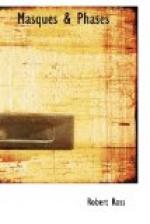However it may be, Professor Lachsyrma is sad, and has not yet issued his edition of the newly discovered poems of Sappho unearthed in Egypt some time since—an edition awaited so impatiently by poets and scholars.
Some years ago, on retiring from his official appointment, Professor Lachsyrma, being a married man, searched for some apartment remote from his home, where he might work undisturbed at labours long since become important pleasures. You cannot grapple with uncials, cursives, and the like in a domestic environment. The preparation of facsimiles, transcripts, and palaeographical observations, reports of excavations and catalogues, demands isolation and complete immunity from the trivialities of social existence.
In a large Bloomsbury studio he found a retreat suitable to his requirements. The uninviting entrance, up a stone staircase leading immediately from the street, was open till nightfall, the rest of the house being used for storage by second-hand dealers in Portland Street. No one slept on the premises, but a caretaker came at stated intervals to light fires and close the front door; for which, however, the Professor owned a pass-key, each room having, as in modern flats, an independent door that might be locked at pleasure. The general gloom of the building never tempted casual callers. The Professor purposely abstained from the decoration or even ordinary furnishing of his chamber. The whitewashed walls were covered with dust-bitten maps, casts of bas-reliefs, engravings of ruins. Behind the door were stacked huge packing-cases containing the harvest of a recent journey to the eastern shores of the Mediterranean. Along one wall mutilated statues and torsos were promiscuously mounted on trestles or temporary pedestals made of inverted wooden boxes. Above them a large series of shelves bulging with folios, manuscript notebooks, pamphlets, and catalogues ran up to the window, which faced north-east, admitting a strong top-light through panes of ground glass; the lower sash was hidden by permanent blinds in order to shut out all view of the opposite houses and the street below. A long narrow table occupied




